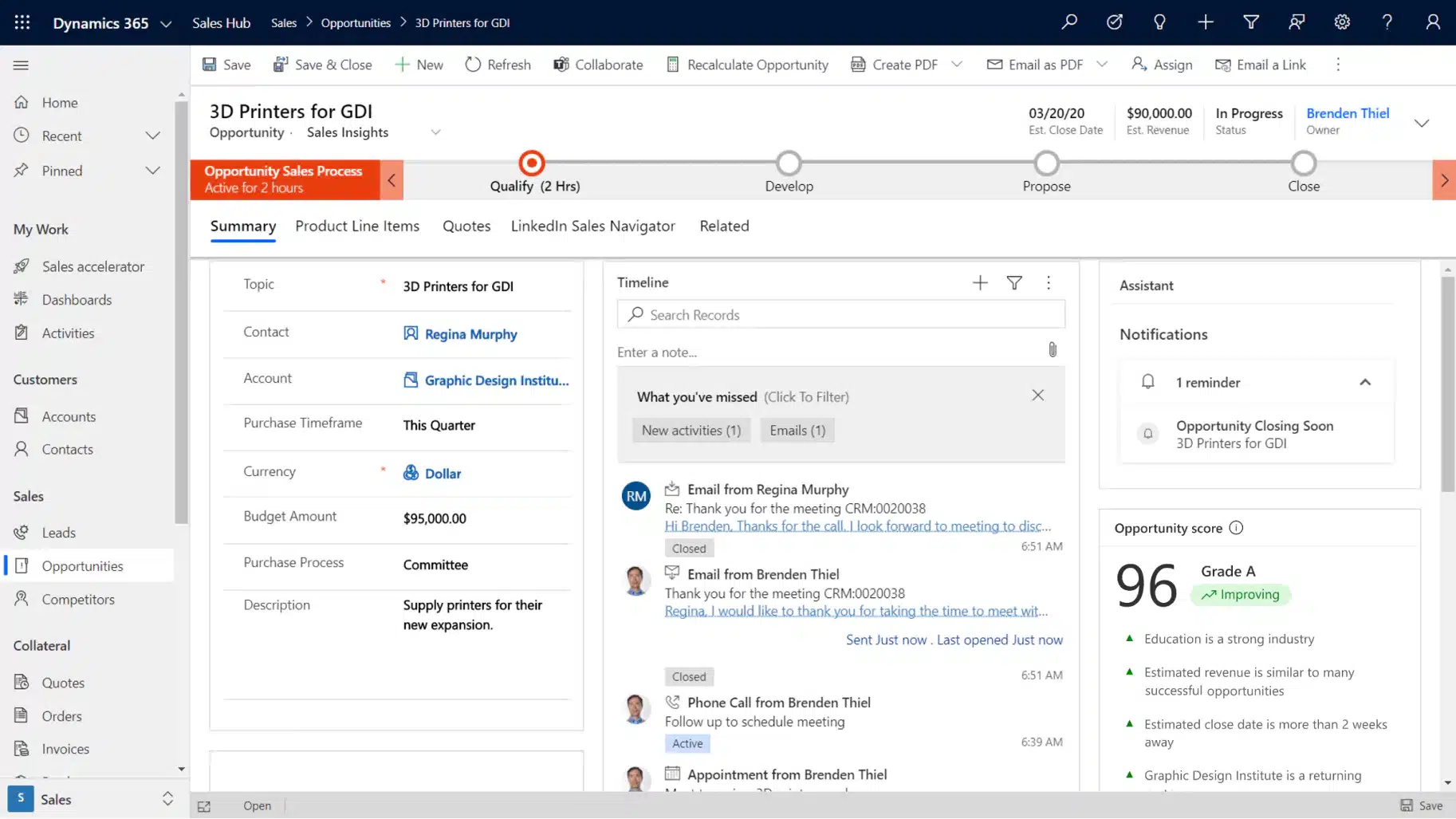Your complete guide to Microsoft Dynamics 365 CRM implementation

Microsoft Dynamics 365 CRM, also known as Dynamics 365 Customer Engagement, is a powerful suite of applications that helps businesses improve customer relationships, streamline processes, and drive revenue growth. Whether you’re implementing Dynamics 365 CRM for the first time or replacing an outdated system, a successful rollout requires careful planning, the right licensing strategy, and expert guidance. In this comprehensive guide, we’ll walk you through everything you need to know to plan and execute a successful Dynamics 365 CRM implementation, from understanding what the platform includes to navigating costs, timelines, and common pitfalls.
In this guide, we will explore the following topics:
- What is Dynamics 365 CRM?
- What is a Dynamics 365 CRM implementation?
- What are my Dynamics 365 CRM licensing & implementation options?
- What are the steps for a successful Dynamics 365 CRM implementation?
- How long does it take to implement Dynamics 365 CRM?
- How much does it cost to implement Dynamics 365 CRM?
- Common Dynamics 365 CRM implementation issues
- Benefits of working with an implementation partner
- Dynamics 365 CRM implementation FAQs
What is Dynamics 365 CRM?
Dynamics 365 CRM is Microsoft’s cloud-based suite of customer relationship management applications designed to help businesses build stronger customer connections, improve service delivery, and drive revenue growth. Also known as Dynamics 365 Customer Engagement, this platform unifies sales, marketing, customer service, and field operations into a single system, giving teams a complete view of customer interactions. With built-in AI, automation, and deep integrations with Microsoft 365, Dynamics 365 CRM empowers organizations to manage the full customer lifecycle, from first touch to long-term loyalty, more efficiently and intelligently.
The apps included in the Dynamics 365 CRM suite are:
- Dynamics 365 Sales: A sales automation platform that leverages AI, real-time insights, LinkedIn integration, and collaboration tools to help sales teams close deals faster.
- Dynamics 365 Customer Insights: A marketing platform (formerly D365 Marketing) that allows businesses to segment audiences, build personalized campaigns, and nurture leads through the funnel.
- Dynamics 365 Field Service: A connected field service solution for managing on-site service operations with work order automation, resource scheduling, and predictive maintenance capabilities.
- Dynamics 365 Customer Service: A comprehensive customer service tool offering case management, knowledge base access, and AI-driven support across multiple channels.

10 CRM software selection mistakes that spell failure
With multiple applications in the Dynamics 365 CRM suite — from Sales and Customer Service to Field Service and Customer Insights — choosing the right combination can be complex. A rushed or misinformed decision can lead to poor adoption, wasted budget, and missed opportunities. Download our whitepaper to avoid common pitfalls and make the right choice for your Dynamics 365 CRM implementation.
What is a Dynamics 365 CRM implementation?
A Dynamics 365 CRM implementation is the process of deploying, customizing, and integrating Microsoft’s customer relationship management applications into a business’s operations. The goal is to align the technology with the organization’s customer engagement strategy, streamline business processes, and improve department collaboration. Whether it’s capturing leads, managing service cases, or running targeted campaigns, a well-executed implementation ensures that Dynamics 365 CRM supports core business functions and delivers measurable value from day one.
Successful implementations go beyond simple software installation. They require a strategic roadmap tailored to the company’s size, goals, and industry. A typical implementation includes key phases such as discovery and planning, solution design, configuration and development, user training, and post-launch support. Each phase plays a vital role in ensuring the system fits the organization’s needs and is adopted effectively by end users. With the right approach and expert guidance, businesses can maximize their return on investment and lay the foundation for stronger customer relationships.
What are my Dynamics 365 CRM licensing & implementation options?
When preparing to implement Dynamics 365 CRM, it’s important to evaluate both your licensing needs and your implementation strategy. Microsoft provides flexible licensing structures to accommodate a variety of business models, and there are two primary implementation paths to consider: self-implementation or partnering with a certified Microsoft Dynamics expert. Choosing the right combination of licensing and implementation approach can significantly impact the efficiency, scalability, and success of your CRM deployment.
Licensing options for Dynamics 365 CRM
Dynamics 365 CRM licenses are available through Microsoft’s partner network and can be tailored to suit your organization’s size, needs, and departmental structure. Microsoft uses a modular pricing system called the Base and Attach model, which allows businesses to license a primary application and then add related apps at a discounted rate. This helps companies scale their CRM capabilities without incurring full license costs for every application.
- Base License: Your starting point is purchasing a full-price license for one Dynamics 365 application. This base license covers the core functionality needed for your business.
- Attach License: After purchasing a base license, you can add licenses for other Dynamics 365 products at a discounted rate. This allows you to integrate additional solutions while optimizing costs.
Keep in mind that not all applications qualify as base licenses, and attach rules vary depending on the combination. A Microsoft partner can help you design a cost-effective licensing strategy that ensures compliance while maximizing your investment.
Self-implementation
Some organizations choose to manage their Dynamics 365 CRM implementation entirely in-house. This involves overseeing everything from system setup and customization to data migration and user onboarding. While self-implementation may initially appear more cost-effective, it requires a high level of technical expertise and familiarity with the Dynamics platform. The process can also be time-consuming and place extra strain on internal resources.
While managing your own deployment offers more control, the risks of misconfiguration, delays, and incomplete adoption are high. CRM systems touch nearly every aspect of customer engagement, so gaps in setup or training can lead to lost productivity and missed business opportunities.
Implementation with a Microsoft Partner
Working with a certified Microsoft partner can significantly reduce risk and improve the outcome of your Dynamics 365 CRM deployment. These experts bring hands-on experience, proven methodologies, and industry-specific insight to help tailor the system to your business. From initial planning and requirements gathering to post-launch support, a partner can manage the entire implementation process and help your team hit the ground running.
Beyond just technical setup, partners also provide training, ongoing support, and optimization services that ensure long-term CRM success. Their involvement often leads to faster go-lives, fewer errors, and smoother user adoption—ultimately driving faster ROI and better alignment with your customer engagement goals.

Unlock the power of Dynamics 365
Request a demo or consultation to explore how this powerful platform can elevate your operations and lead your business to greater success.
What are the steps for a successful Dynamics 365 CRM implementation?
Implementing Dynamics 365 CRM successfully requires a structured, strategic approach that aligns technology with your business goals. At Rand Group, we follow a five-phase implementation methodology that helps organizations configure, deploy, and adopt the solution with confidence. These steps ensure that every part of the system is tailored to your specific processes and that your team is prepared to use it effectively. This framework is the result of years of experience guiding clients through complex CRM projects across industries.

Envisioning & Design
The journey begins by understanding your organization’s needs, challenges, and goals. Our team collaborates with your stakeholders to gather requirements, define success metrics, and map out business processes. We then create a detailed design blueprint that reflects how Dynamics 365 CRM will support and enhance your operations.

Build
In this phase, our consultants and developers configure the system according to the approved design. This includes setting up the core applications, building custom forms or fields, defining user roles, and importing legacy data. Every element is fine-tuned to match your workflows and user needs.

Test
Once configuration is complete, we move into testing. This step involves functional and performance testing, user acceptance testing (UAT), and data validation to ensure the system is working as intended. It’s also an opportunity to gather feedback and make final adjustments before go-live.

Deploy
With testing complete and the system ready, we execute the deployment plan. Rand Group supports a smooth transition to production, coordinating activities like final data migration, environment setup, and go-live scheduling. Our team stays closely involved to troubleshoot any early issues and ensure stability.

User Adoption
After go-live, we focus on driving adoption across your organization. Through tailored training sessions, user support, and knowledge-sharing resources, we help your team fully leverage Dynamics 365 CRM’s capabilities. Ongoing support ensures that your investment continues to deliver value over time.
How long does it take to implement Dynamics 365 CRM?
The timeline for implementing Dynamics 365 CRM can vary widely depending on the scope and complexity of your project. Factors such as how much customization is needed, the number of users, the extent of data migration, and the level of system integration all influence the overall duration. Setting a realistic schedule starts with understanding your specific requirements and any potential roadblocks that could extend the project.
Here are some of the factors that could influence the duration of your implementation:
- Business complexity: More complex operations or multiple business units can extend the timeline.
- Level of customization: Heavily customized implementations require more time for development and testing.
- Data migration needs: The volume and complexity of data to be migrated can impact the timeline.
- Integration requirements: Integrating Dynamics 365 with other business systems or third-party apps adds additional time.
- User training: The number of users needing training can impact the duration of the final phase of implementation.
- Resource availability: The availability of both internal and external resources can speed up or slow down the project.
There are two primary implementation options: traditional implementation and rapid activation. A traditional implementation generally takes 3 to 6 months, while a rapid activation approach can be completed in 6 to 12 weeks.
Traditional implementation
A traditional implementation approach is ideal for businesses with detailed requirements, complex processes, or a need for extensive customization and integrations. This method takes a methodical path through discovery, design, configuration, testing, and training, typically spanning 3 to 6 months to ensure all business needs are fully addressed.
Envisioning & Design
2 – 4 weeks
Build
3 – 6 weeks
Test
3 – 6 weeks
Deploy
1 – 3 weeks
User Adoption
4 – 8 weeks
Rapid activation implementation
For organizations that need to get up and running quickly and have straightforward requirements with limited customization, Rand Group offers a rapid activation model. This streamlined approach accelerates the setup of Dynamics 365 CRM while still delivering a functional, scalable solution. Most rapid activations are completed in 6 to 12 weeks.
Pre-configuration
1 – 2 weeks
Configuration
2 – 5 weeks
Train and Test
2 – 4 weeks
Production cutover
1 week
How much does it cost to implement Dynamics 365?
The cost of implementing Dynamics 365 CRM can vary widely, starting at $25,000 and ranging to $250,000 or more, depending on the size and complexity of the project. This one-time investment covers activities like system setup, configuration, data migration, training, and custom development. Factors such as how many users you’re onboarding, how complex your workflows are, and how many systems need to be integrated all influence the final price.
Key drivers of implementation cost include licensing, the extent of customization, third-party integrations, and the quality of historical data that needs to be migrated. A well-scoped, high-quality implementation ensures long-term ROI and minimizes costly rework. While low-cost implementations may seem appealing, they often rely on offshore teams with limited product knowledge, leading to misaligned solutions or failed projects that can be significantly more expensive to fix down the line.
While it is possible to find cheaper implementation options, these implementations often involve offshore resources. However, these frequently lead to failed implementations due to communication gaps, lower quality control, or a lack of in-depth expertise. Correcting a failed or subpar implementation can result in costs that are twice as much as doing it right the first time. Therefore, it is crucial to invest in a well-executed implementation from the start.

Get a Dynamics 365 CRM implementation estimate
Every company is unique—get a free consultation with one of our Microsoft Dynamics 365 experts to determine your Dynamics 365 needs and receive an implementation estimate.
Common Dynamics 365 CRM implementation issues
Implementing Dynamics 365 CRM can bring powerful business benefits, but without the right strategy and oversight, it’s easy to run into problems. Industry data suggests that a significant percentage of enterprise software projects—often between 55% and 75%—fail to meet their original goals. The reasons range from unclear objectives and misaligned expectations to poor user adoption and technical missteps. Without careful planning and skilled execution, organizations risk falling short of the system’s full potential, resulting in missed opportunities, frustrated teams, and costly rework.
Below are some of the most frequent issues that can derail a Dynamics 365 CRM implementation:
- Insufficient project planning and scope definition
- Lack of stakeholder alignment or executive sponsorship
- Poorly defined business processes or requirements
- Inadequate data migration or integration strategy
- Limited user training and change management
- Over-customization leading to increased complexity
- Miscommunication between IT and business teams
Implementing a CRM system isn’t just about getting the technology in place, it’s about aligning people, processes, and systems. Choosing an experienced Microsoft partner with a proven track record in Dynamics 365 CRM can dramatically reduce risk, streamline the process, and help your team unlock the platform’s full capabilities with confidence.
Benefits of working with an implementation partner
Engaging a certified Microsoft implementation partner brings several advantages for organizations deploying Dynamics 365 CRM. These partners bring deep platform expertise, structured methodologies, and a practical understanding of how to align CRM technology with real-world business processes. Rather than navigating complex configuration, data migration, and user training alone, businesses benefit from a knowledgeable team that can streamline deployment, avoid costly mistakes, and drive faster time-to-value. An experienced partner ensures the solution is not only technically sound but strategically aligned with your customer engagement goals.
At Rand Group, we do more than just configure software; we partner with you to transform the way your business connects with customers. As a long-standing Microsoft Dynamics 365 CRM partner with deep expertise in both CRM and business operations, we guide you through every phase of implementation with a strategic, hands-on approach. Whether you’re modernizing legacy systems or launching your first CRM platform, we help you get it right the first time. From discovery to post-launch optimization, our team is committed to delivering measurable business impact and lasting results.
Services we offer:
- Comprehensive implementation services: Rand Group offers end-to-end implementation services that cover every phase of your Dynamics 365 journey. From initial planning and design to deployment and user adoption, we ensure your solution is tailored to meet your business goals while minimizing disruption.
- Expert guidance and support: Our team of certified consultants provides expert guidance every step of the way. We help you navigate complex challenges, optimize your system, and ensure your technology investments deliver the highest value for your business.
- Proven methodology based on best practices: We follow a structured implementation approach rooted in industry best practices. Our methodology ensures efficient project management, timely delivery, and minimized risks, enabling a smooth transition to Dynamics 365.
- Post go-live support and continuous optimization: Our commitment doesn’t end after deployment. We provide ongoing support to help you maximize the value of your Dynamics 365 investment. Whether it’s troubleshooting, system enhancements, or process optimization, we’re here to ensure continued success.
Dynamics 365 CRM implementation FAQs
Get answers to common questions about implementing Microsoft Dynamics 365:
- Can I implement D365 CRM by myself?
Yes, but self-implementation is generally not recommended unless you have deep internal expertise. It can be risky, time-consuming, and lead to costly mistakes, which is why most choose to work with a Microsoft partner. - How much does a D365 CRM implementation cost?
Costs typically range from $25,000 to $250,000 or more, depending on your specific requirements. Factors like the number of users, level of customization, data migration, and integration needs all contribute to the total investment. - Is D365 CRM easy to implement?
While the platform is intuitive for users, configuring it to match your business processes is a different matter. Without a clear plan and technical know-how, implementation can quickly become overwhelming. That’s why most organizations choose to work with a certified partner to streamline the process and reduce risk. - What are the stages of a D365 CRM implementation?
The main stages are envisioning and design, build, test, deployment, and user adoption. Each phase ensures alignment with your business needs and prepares the system for successful use. - How long does it take to implement D365 CRM?
Traditional projects take about 3 to 6 months, especially when complex customization or integrations are involved. For businesses looking for a faster rollout, Rand Group also offers Rapid Activation, which can be completed in 6 to 12 weeks for streamlined deployments.
Next steps
Implementing Microsoft Dynamics 365 CRM is a strategic move toward better customer engagement, streamlined processes, and improved team collaboration. At Rand Group, we partner with you through every step of the journey, from planning and system design to deployment and long-term optimization. As a trusted Microsoft partner, we bring a deep understanding of CRM strategy, industry-specific requirements, and technical best practices to deliver a solution tailored to your business.
Ready to take the next step? Contact Rand Group today to learn how we can help you implement, configure, and optimize Dynamics 365 CRM for long-term success.




